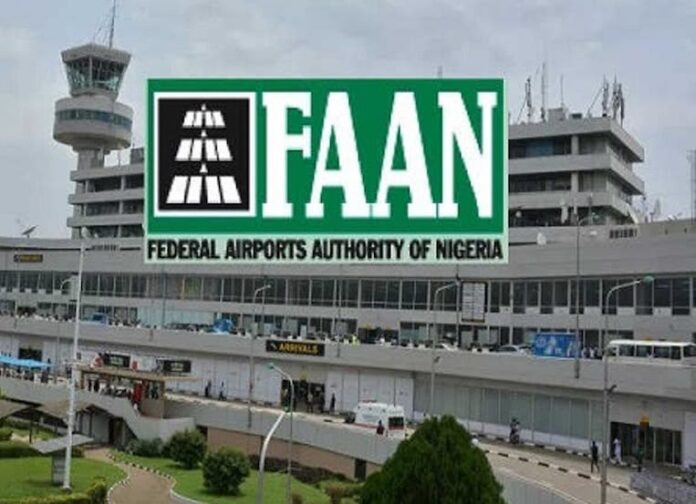…Incidents Not Connected To Runway Maintenance — FAAN
Chigozie Amadi
LAGOS – Following the incessant incidents on the domestic runway (18L) of the Murtala Muhammed Airport (MMA), Lagos, especially during downpours, aviation experts have queried the quality of the runway and the adherence to its maintenance schedule 18 months after its reopening.
This is as the Federal Airports Authority of Nigeria (FAAN) has said that the recent serious incidents on the runway involving Dana Air aircraft on April 23, 2024, and the Saturday’s XeJet Aviation were not connected to the condition of the runway, however, it said that safety reports by the Nigerian Safety Investigation Bureau (NSIB) would clear the grey areas on the issues.
Experts spoken to by Daily Independent suggested that rather for the government to focus its attention on the operating airlines, the government and its agencies should shift their attention to the runway condition.
FAAN had on July 7, 2022 shutdown the 2.7 kilometres (2,700m) long runway 18L/36R for repair with a promise to re-open it within 90 days, but it took the agency over 120 days to reopen the facility for use, November 22, 2022, to be precise.
FAAN had planned to install approach lights, runway lights (threshold and centre, edge light) and others on the runway, which until the closure could only operate sunrise services.
The runway was unveiled in 2007 after extensive repair works were carried out on it by the Federal Government.
But, unfortunately, the runway lighting, which would enable aircraft to land on it at sunset, was not reinstalled by the government.
FAAN had promised then that the airfield lighting would be installed “in the next few months,” but it lingered for another 15 years.
Speaking on the recent incidents on the runway, Capt. Muhammed Badamasi, a retired pilot with the defunct Nigeria Airways, said that aircraft skidding on wet runways were usually caused by abnormal volume of rain water (contamination) on poorly maintained runways.
He mentioned tyre rubber accumulation on the runway due to continuous landing of aircraft, hydraulic fluid and lubricants from aircraft spillages on the touchdown zone of the runway and rain water in excess of 3mm on the runway as some of the factors that may be responsible for the quality of a runway and skidding of aircraft on landing.
Besides, Badamasi emphasised that the final decision to land on a runway rests solely with the pilot, which he said is based on the report received from the airport air traffic controller and a real-time weather report available.
Badamasi doubted if FAAN had ever cleaned the runway surface since it was reopened about 18 months ago and queried the competence of the management.
He also explained that the Nigeria Civil Aviation Authority (NCAA) as the apex regulatory body in the sector has the responsibility to know the condition of the runway surface and, if necessary, direct FAAN to improve the quality of the runway through periodic maintenance.
He said: “These combinations make the runway slippery. This is what happens on the motorways when there’s diesel spillage mixed with a little rain on it.
“Though this is the wrong time to focus on the runway when two incidents with similarity have occurred. It’s not too late to beam a searchlight on the runway. We are in the middle of the rainy season, and more rains will fall.
“While NCAA is busy suspending airlines for incidents, instead of knowing the causes responsible for the incidents, the more likely that similar incidents occur. If an aircraft skids on a clean and dry runway, it could be due to strong crosswind or landing gear failure.”
He challenged NSIB to release to the public early its preliminary results of recent occurrences to determine their primary causes, adding that the integrity of the runway surface should also be a part of the investigation by the bureau.
Besides, Grp. Capt. John Ojikutu, aviation analyst, questioned the quality of derubberisation purportedly carried out on the runway as claimed by FAAN two days before the Dana Air serious incident on the same runway.
He also queried the integrity of the company that carried out the derubberisation of the runway, wondering if it was certified by the NCAA.
Ojikutu also asked if the NCAA was informed before or after the derubberisation exercise or if the agency’s inspectors in conjunction with the air traffic controllers of the Nigerian Airspace Management Agency (NAMA) conducted inspection on the facility before it was opened for air traffic landing.
Also, Ojikutu declared that apart from the Lagos airport, other airports across the country under the control of FAAN were not free from the hazard, doubting if they complied with the programmes of their periodic maintenance.
He added: “What is happening in MMA (Lagos airport) is similar to what had happened to many airlines’ aircraft in Port Harcourt airport runway. It is for the NCAA too to review or reconsider its checklist for the periodic auditing of the airports’ runways.
“The questions that FAAN and the NCAA must answer from what is becoming too embarrassing to conceal is, which agent is certified for the derubberisation of the runway and for the approved periodic maintenance of the runway?
“FAAN claimed it did the derubberisation of the runway preceding Sunday before the Tuesday that the Dana incident happened, who did the derubberisation and had the agent or FAAN that did the derubberisation have the NCAA certification for such maintenance work?”
Mr. Olumide Ohunayo, the Director, Research, Zenith Travels Ltd, said that the operating airlines in the country had been vilified by the suspension of Dana Air, but said the latest serious incident on the same runway called for critical searchlight on the facility.
Like others, he queried the derubberisation of the runway and the company in charge of such an exercise.
He enjoined the government and its agencies to beam their searchlight on the approach path management, especially the period between the tower and the pilot in command.
Ohunayo also wanted FAAN to take a critical look at the effectiveness of the drainage system and the maintenance of the runway like cleaning of debris, and the runway markings.
“May be the minister would be thinking of closing down everything now since it has happened again. We should learn to allow the agencies in charge of all these to perform their duties without any interference at this time.
“Today, Dana has asked all their staff to go home and with this, some people have lost their jobs while others are now in the unemployment market. The industry is struggling to breathe and you are now sending people out of work. This is due to the decision of the minister,” he said.
Mr. Frank Oruye, aviation expert, expressed sadness over the recurring issue.
He called on the investigation team to focus on runway contamination and the inherent drainage system design and functioning, while also examining the aircraft tyre conditions and the anti-skid systems as possible suspects in such incidents.
A source, who didn’t want his name in print, attributed the deterioration of safety standards in the system to the recent incidents in the sector.
The source mentioned poor NCAA oversight, poor quality of airline post-holders and poor corporate governance among the domestic airlines as some of the deteriorations in the system in recent times.
However, Mrs. Obiageli Orah, the Director, Public Affairs and Consumer Protection, FAAN, said that the two recent incidents could not be attributed to the condition of the runway.
She said FAAN had been carrying out a period and required maintenance on the runway and others, but said the agency would await the NSIB preliminary report on the two incidents.
Dana Air aircraft had on April 23, 2024 skidded off the Lagos airport runway on landing after a downpour.
Also, on Saturday, XeJet Airlines aircraft skidded off the runway on landing at the same airport with 55 persons on onboard.

























